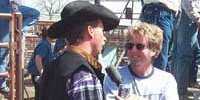Lewis & Clark: Miles City Bucking Horse Sale
 3:55
Barrett Golding
3:55
Barrett Golding
Riding broncs at the Miles City Bucking Horse sale.
Broadcast: Oct 17 2003 on NPR Living on EarthSeries: Lewis & Clark Trail: 200 Years Later Subjects: Business, Sports
Lewis & Clark Trail: Bucking Horse Sale
October 17, 2003
STEVE CURWOOD, host: This year marks the 200th anniversary of the Lewis & Clark expeditions.
[WATER SPASHING; SOUND OF CRICKETS AND FROGS]
MALE: Paddle. C'mon harder.
CURWOOD: We wondered who lives and works along the trail now, from the Northwest Coast to the mouth of the Missouri.
[DRUM BEAT, WOMAN YELLING, "ONE, TWO, THREE!; MUSKET SHOT; SOUND OF CRICKETS AND FROGS]
CURWOOD: Producer Barrett Golding bicycled the entire Lewis and Clark Trail and sent us a series of audio postcards.
[SOUNDS OF AUCTIONEER]
CURWOOD: Like this one from eastern Montana along the Yellowstone River where each year the town of Miles City hosts the famous Bucking Horse Sale where broncs and bulls are rode and sold. It's a rodeo, an auction, and, for people like Doug Davis of Hot Springs, Montana, a way of life.
DAVIS: Well, yeah, I rodeo, bud. Bronc rider, bull rider. I rode bulls last night and I'm riding two broncs today and just having a good old time. I brought my ten year old son. This is something you've got to see now because it may not last. It is such a great time to get on a bucking horse. One that really bucks hard and really goes at you. It's also a lifestyle that my family's revolved around. It's all we do, rodeo. I mean we have to work but we rodeo. That's our main thing to do.
[SOUND OF AUCTIONEER]
DAVIS: Just a little while ago I got bucked off right outside of that shoot, not very far, and I just laid on the ground with my head like this, like, hmm, how the hell did that happen? The horse beat me. She beat me out of there, she got ahead of me. She bucked me off and I just laid there on the ground, my head like this, going – pretty nice horse. You know, take your hat off to the horse, a little respect for the animal. They beat you. It's a game – competitive.
[SOUND OF METAL CLANKING, CHEERING]
MALE: Come on! Come on! Come on!
DAVIS: You got competitors, but you're friendly with your competitors. You're partners. I mean, the guy that's helping you saddle your horse is going to try to beat you. It don't matter. He's going to help you get things right. That's just the way we do it. It's just a cowboy thing, you know.
This is the greatest sport in the world. It originated here in this country. It's tough, and it's fun, and it's a passion.
[SOUND OF AUCTIONEER; YELLING; METAL CLANKING]
DAVIS: I was 17 when I started riding bulls. I'll be 34 next month. I got a scar from here to here last Fourth of July, and 42 staples in my belly. A bull stepped underneath my vest and ripped my guts open. Cost me 20 grand. So, you look at that and you think, all right, I've got a ten year old boy, I've got a wife, a job. Should I quit this? Oh yeah, for about four months I did. Got held up, jumped right back out there and went back at it. It's just life. Go for it. You know it ain't that life's too short; it's just that you're dead for so long. So get all of it you can. You've got to get it all.
[SOUND OF HORSE BRAYING]
CURWOOD: Doug Davis of Hot Springs, Montana. Barrett Golding's portraits of "The Lewis & Clark Trail: 200 Years Later" are part of the Hearing Voices series, funded in part by the Corporation for Public Broadcasting. For more audio, images and interviews from the trail, go to our website, livingonearth.org. And you're listening to NPR's Living on Earth.

